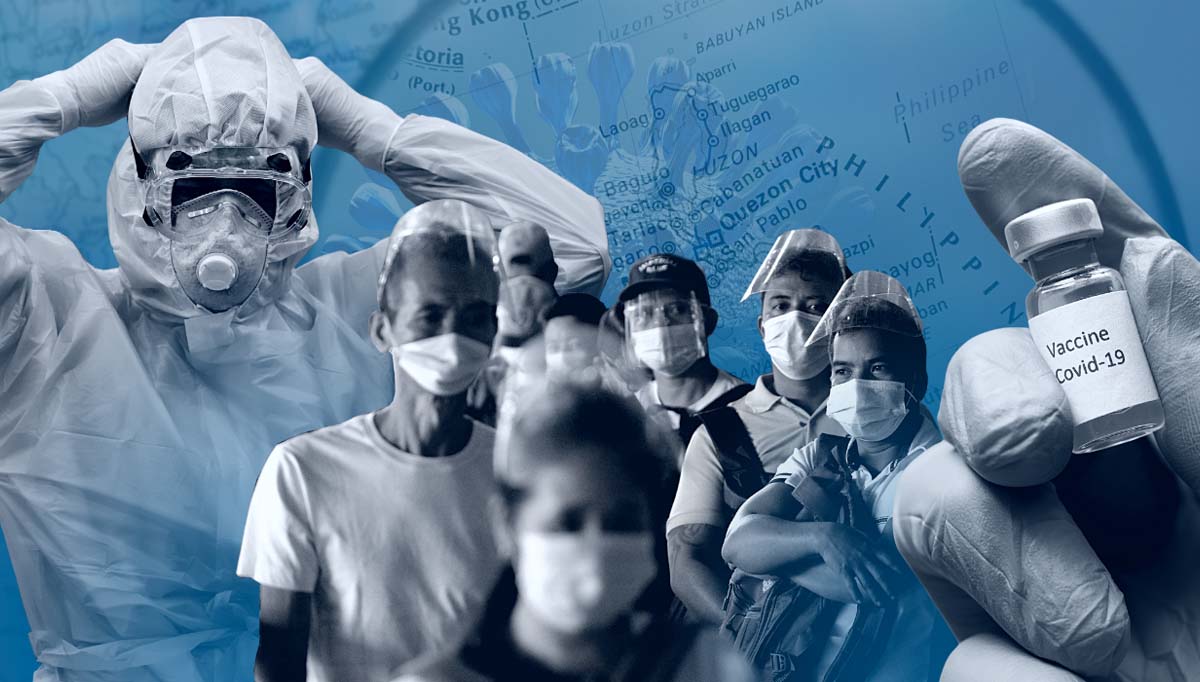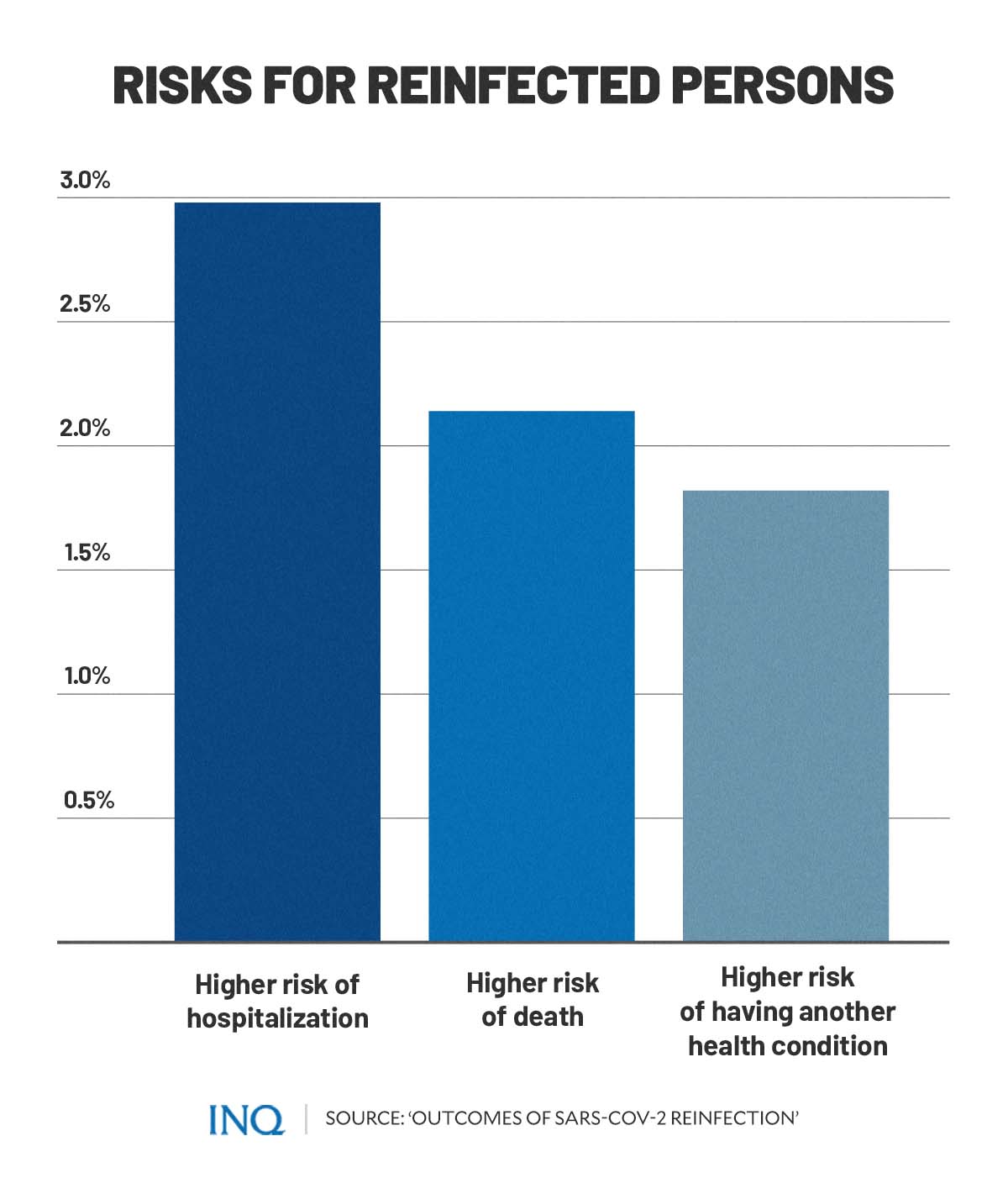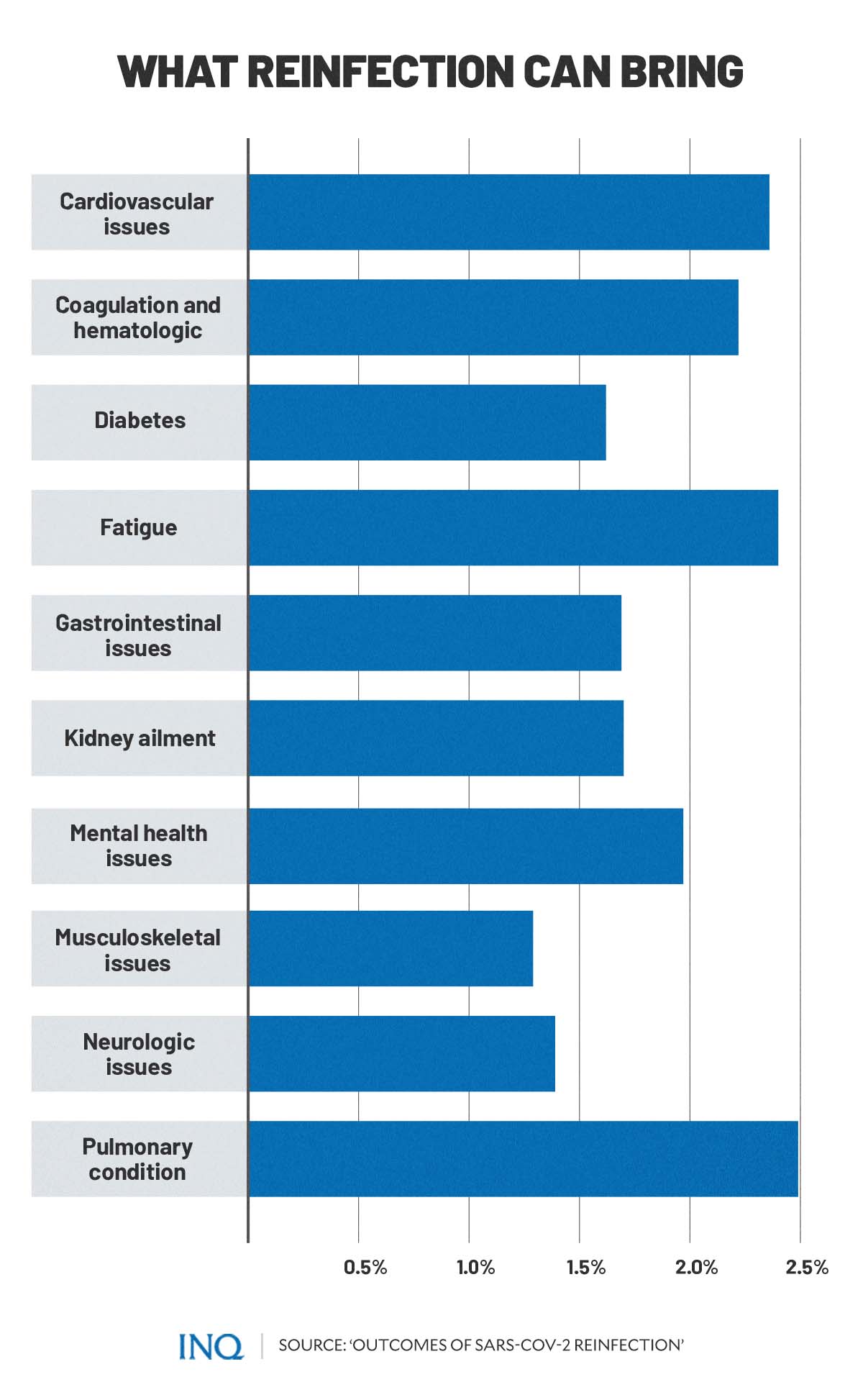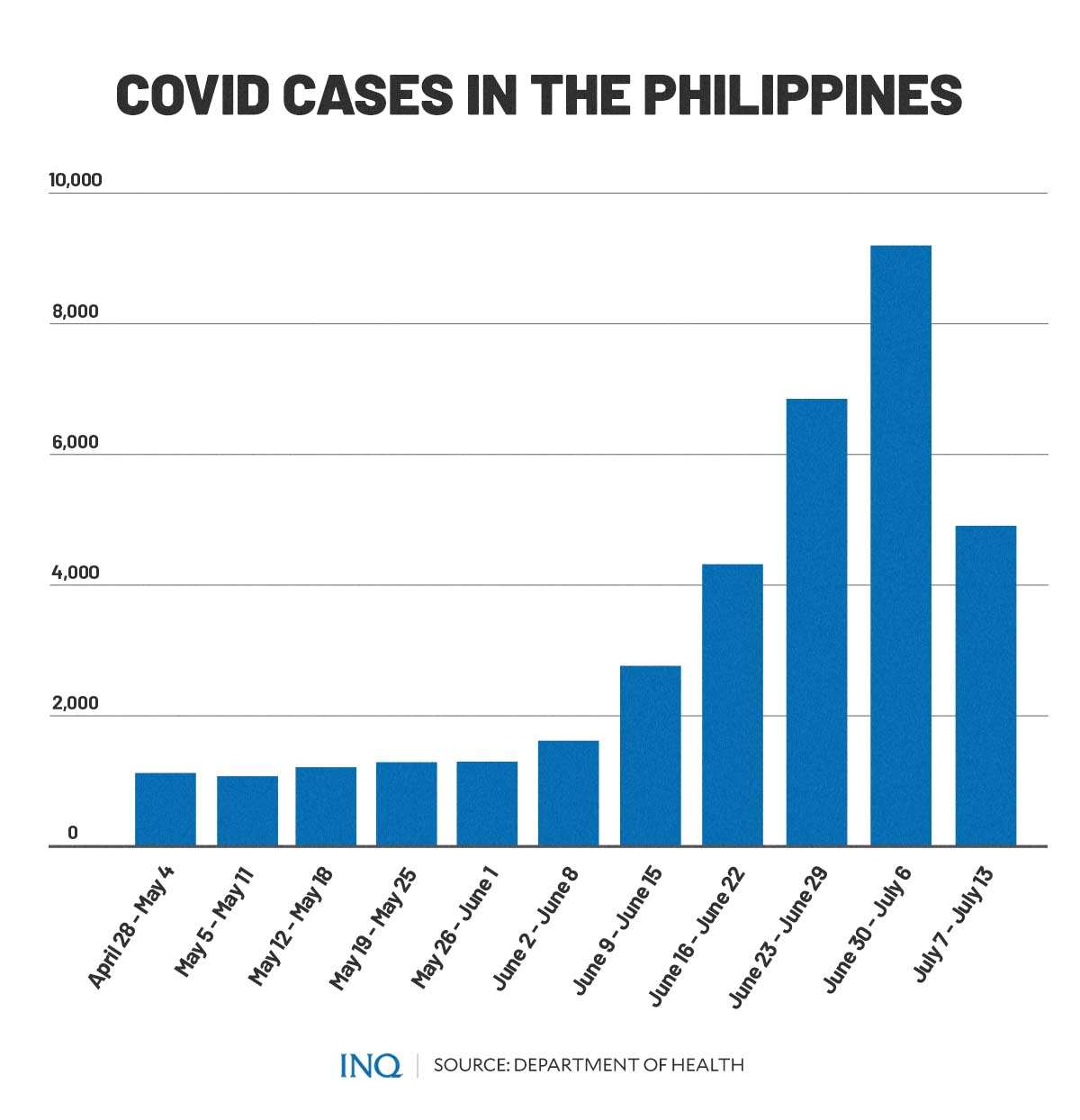COVID can reinfect you, raise health risks: What to know
MANILA, Philippines—Aside from the risk of getting mid-and long-term effects of COVID-19, scientists have also recently found that repeatedly catching SARS-CoV-2 (the virus that causes the disease) could also increase the chances of additional health risks.
Health experts and previous studies have found that some people, who have been infected with the SARS-CoV-2 virus, can have “a variety of mid-and long-term effects after they recover from their initial illness.”
These mid-and long-term effects, according to World Health Organization (WHO), are collectively known as the post-COVID-19 condition or long COVID.
“Post COVID-19 condition, also known as ‘long COVID,’ refers collectively to the constellation of long-term symptoms that some people experience after they have had COVID-19,” said WHO.
“[The] condition is defined as the illness that occurs in people who have a history of probable or confirmed SARS-CoV-2 infection, usually within three months from the onset of COVID-19, with symptoms and effects that last for at least two months,” WHO explained.
Article continues after this advertisement“The symptoms and effects of the post-COVID-19 condition cannot be explained by an alternative diagnosis. Post COVID-19 condition can affect a person’s ability to perform daily activities such as work or household chores,” it added.
Article continues after this advertisementREAD: Understanding ‘long COVID’ and how to prevent it
Other than long-term COVID symptoms, a recently released preprint study showed that the risk of getting ill with other health issues was higher among people who had been infected twice or thrice than those who had been infected just once.
“Whether reinfection adds to the risk incurred after the first infection is not clear. And whether reinfection contributes to increased risk of post-acute sequelae [aftereffect or secondary result of a disease, condition, or injury] is also not known,” the study stated.
“Addressing these questions has broad public health implications as it will inform whether strategies to prevent or reduce risk of repeat infections should be implemented.”
In this article, INQUIRER.net will discuss the findings of the first study on the health risks of COVID reinfection conducted and published by lead researcher Dr. Ziyad Al-Aly, a clinical epidemiologist at Washington University in St. Louis.
Reinfection, new health risks
“A large body of evidence suggests that first infection with SARS-CoV-2 is associated with increased risk of acute and post-acute death and sequelae in the pulmonary and broad array of extrapulmonary organ systems,” the scientists wrote.
“However, whether reinfection adds to the risk incurred after the first infection is not clear.”
According to Johns Hopkins Medicine, individuals who have had severe COVID-19 may develop or experience health problems after recovery. Severe COVID can also exacerbate existing heart conditions, it said.
In the study titled “Outcomes of SARS-CoV-2 reinfection,” Al-Aly, along with researchers and scientists Benjamin Bowe and Yan Xie examined a total of 257,427 participants with first SARS-CoV-2 infection and 38,926 participants who had SARS-CoV-2 reinfection at least twice or more.
Among those with reinfection, 36,417 (12.29 percent) people had two infections, 2,263 (0.76 percent) people had three infections, and 246 (.08 percent) people had four or more infections.
The study also had 5,396,855 participants with no record of SARS- CoV-2 infection for the control group. All were from the vast electronic health care databases of the US Department of Veterans Affairs.
The scientists found that compared to those with first infection, people with reinfection exhibited increased risks of all-cause mortality, hospitalization, and several pre-specified outcomes.
Among the common new diagnoses after reinfection included adverse health outcomes in the pulmonary and several extrapulmonary organ systems. These include cardiovascular disorders, coagulation and hematologic disorders, diabetes, fatigue, gastrointestinal disorders, kidney disorders, mental health disorders, musculoskeletal disorders, and neurologic disorders.
The study also showed that the risks were evident in subgroups, including those who were unvaccinated against COVID-19, had one shot, or two or more shots before the COVID reinfection.
“Altogether, the findings show that reinfection adds non-trivial risks of all-cause mortality and adverse health outcomes in the acute and post-acute phase of the reinfection,” the study said.
“The findings highlight the consequences of reinfection and emphasize the importance of preventing re-infection SARS-CoV-2,” it added.
“The constellation of findings shows that reinfection adds non-trivial risks of all-cause mortality, hospitalization, and adverse health outcomes in the acute and post-acute phase of the reinfection.”
By the numbers
The researchers found that compared to people who had COVID-19 once, those with reinfection “exhibited increased risks of all-cause mortality, hospitalization, and several pre-specified outcomes.”
In detail, the study showed that the risk of death, hospitalization, and having at least one new health condition was 2.14 percent, 2.98 percent, and 1.82 percent higher among those who had SARS-CoV-2 reinfection compared to those who got infected only once.
The likelihood, or risk, of having the following new health conditions among people with reinfection was:
- Cardiovascular: 2.36 percent
- Coagulation and hematologic: 2.22 percent
- Diabetes: 1.62 percent
- Fatigue: 2.4 percent
- Gastrointestinal: 1.69 percent
- Kidney: 1.7 percent
- Mental health: 1.97 percent
- Musculoskeletal: 1.29 percent
- Neurologic: 1.39 percent
- Pulmonary: 2.49 percent
The study also discovered that the risks of death, hospitalization, and having new medical conditions were most evident in the acute phase, or when COVID-19 symptoms have appeared, which usually last for one to two weeks.
The risks were, however, still present in the post-acute phase of reinfection, and risks for most sequelae were still evident at six months.
“Questions have been raised whether reinfection increases the risk of long COVID – the umbrella term encompassing the post-acute sequelae of SARS-CoV-2 infection,” the study read.
“Our results show that beyond the acute phase, reinfection with SARS-CoV-2 contributes substantial additional risks of all-cause mortality, hospitalization, and post-acute sequelae in the pulmonary and broad array of pulmonary organ systems.”
Moreover, data showed that the risks were also evident in those who were unvaccinated, had one shot, or two or more shots prior to the second infection.
The risk and six-month burden of death, hospitalization, at least one sequela, and sequelae by organ system in SARS-CoV-2 reinfection compared to first SARS-CoV-2 infection by vaccination statues at the time of reinfection were:
“Our results expand this evidence base and show that reinfection adds risk in both the acute and post-acute phase and that this was evident even among fully vaccinated people—suggesting that even combined natural immunity (from prior infection) and vaccine-induced immunity does not abrogate risk of adverse health effects following reinfection,” the researchers said.
Amid rising reinfections, Omicron subvariants
Over three years into the pandemic, as cases of COVID-19 continue to ramp up globally and as the SARS-CoV-2 virus continues to mutate, the study’s researchers highlighted the importance of prevention against reinfection.
https://www.facebook.com/inquirerdotnet/posts/pfbid03wngrRyUC5rZHaJb5WQj6K6PSzZXNeorzVx4CVMqMqsbtuNi82e7XZfM81qcZbSBl
READ: Unending mutation of the COVID virus brings a new creature: BA.2.75
According to a separate study, people who have been infected with the SARS-CoV-2 virus can expect to become reinfected within one or two years—unless they take precautions such as wearing masks and getting vaccinated.
However, another study found that in several countries, the number of people reinfected with the virus has been rising sharply amid the increasing cases involving the Omicron variant.
Al-Aly and his co-researchers noted that prevention of infection and reinfection with SARS-CoV-2 should remain the goal of public health policy.
“In this work, we show that reinfection adds risk of all-cause mortality and adverse health outcomes in both the acute phase and the post-acute phase of reinfection—suggesting that for people who were already infected once, continued vigilance to reduce risk of reinfection may be important to reduce overall risk to one’s health.”
“Given the likelihood that SARS-CoV-2 will remain a threat for years, if not decades, we urgently need to develop public health measures that would be embraced by the public and could be sustainably implemented in the long-term to protect people from re-infection.”
The researchers also suggested pharmaceutical interventions to help reduce both the risk of reinfection and its adverse health consequences.
TSB
For more news about the novel coronavirus click here.
What you need to know about Coronavirus.
For more information on COVID-19, call the DOH Hotline: (02) 86517800 local 1149/1150.
The Inquirer Foundation supports our healthcare frontliners and is still accepting cash donations to be deposited at Banco de Oro (BDO) current account #007960018860 or donate through PayMaya using this link.





